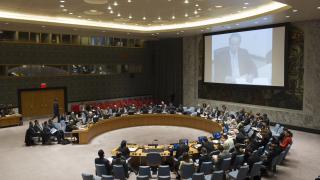
For United Nations Day 2013, let’s acknowledge the UN’s achievements
The founding of the United Nations in 1945 offered a war-weary world hope for a new era of peace and progress.
It can be hard to believe in this promise today. Far too many people still die each year from violence, disasters and deprivation. Over a billion struggle to get by on less than £1 a day. Even more lack access to basic necessities. The world’s richest one per cent, meanwhile, owns over 40 per cent of the world’s wealth. In some countries, low birth rates and ageing populations have governments worried about pensions and elder care. In others, children are being born into terrible conditions.
Human rights violations persist in all corners of the globe. Humanitarian emergencies are set to increase while a robust response to climate change continues to elude us. The number of people uprooted by conflict or persecution is at its highest level in 18 years. And despite the tragic lessons of the past, the ongoing crisis in Syria is a grim reminder that we have still not managed to make a reality of the words, “never again”.
But while we cannot lose sight of the UN’s growing to-do list, we must also remember its achievements. In many ways, the world has become a better place since its inception. Today, most people live longer, healthier lives. Human development, measured in terms of life expectancy, education, health, income and living standards, increased by 18 per cent between 1990 and 2010. During the past decade, the average annual death toll from warfare was half of what it was in the 1990s, and a third what it was during the Cold War.
The UN has made a significant contribution to these advances, presiding over progress in international law; developing mechanisms for peacekeeping; building programmes for poverty alleviation; and facilitating the peaceful transition to independence of scores of former colonies, radically changing the makeup of today’s world.
In recent years, the economic downturn, political deadlock over Syria and insular governments have led commentators to predict the UN’s demise. Others say it has proved remarkably resilient, pointing to its increasing importance in a rapidly shifting, interdependent world.
The truth is somewhere in between. The UN will never fulfil the hopes of its most fervent advocates and its inevitable mistakes will continue to provide fodder for its detractors. But as a place for nations to convene, as a setter of important global norms, and as a provider of essential services, from emergency food relief to human rights monitors and peacekeepers, the UN will surely remain a significant actor as it approaches its 70th birthday.
There is certainly no shortage of challenges that require international co-operation. The United Nations, both flawed and indispensable, will continue to be called upon.












